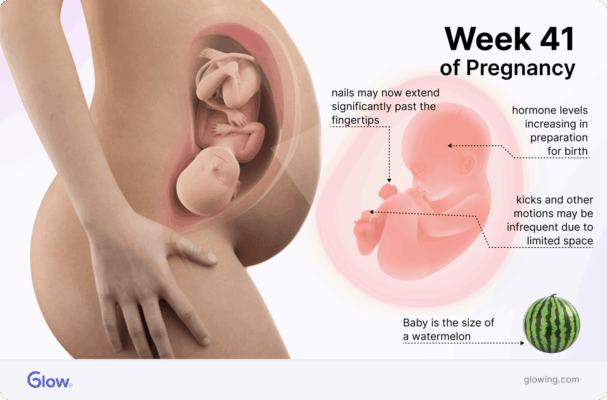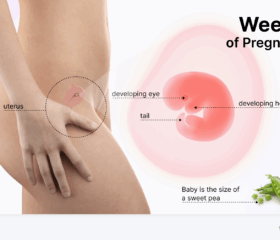Pregnancy Week by Week
41 Weeks Pregnant
Your baby is as big as a watermelon.
20.5
inches
7.93
pounds
- 41 Weeks Pregnant: What to Expect When Your Baby Is Overdue
- Your baby at 41 weeks
- What's happening with your body: changes and symptoms
- Signs of labor at 41 weeks
- What issues deserve immediate doctor attention?
- How to cope with being overdue
- Labor induction: when you’ll need it and what to expect
- The home stretch
41 Weeks Pregnant: What to Expect When Your Baby Is Overdue
You’re not alone in being overdue with your pregnancy. This article will explain what you can expect when your baby is fashionably late and offer tips on maintaining your health, patience, and positive state of mind as you await her grand entrance.
Your baby at 41 weeks
At 41 weeks, you and your baby are officially a late-term duo, joining just over 5% of parents in a similar scenario. 1
This can leave you questioning everything. Is something wrong with you? With the baby? Breathe deep and know that just about 5% of babies pop out exactly when they’re expected. Due dates are often more like estimates than rigid plans, so don’t worry if the date’s already past what your doctor said or the due date calculator you used indicated.
Let’s look at what your precious little loaf of bread is doing with her extra baking time. 2
- Size: At this stage of your pregnancy, your growing bump is comparable in size to a pumpkin or a watermelon. Your baby probably measures around 20 inches long, and she’s tipping the scale at almost 8 pounds. 3
- Appearance: That waxy vernix coating she was rocking earlier to protect her skin will be thinning out. Both your baby’s hair and nails have gotten longer, too.
- Development: Your baby’s ready to face life head-on with fully developed organs. Her endocrine system is also churning out powerful hormones to help nudge your labor along and support her outside the womb.
Be aware that your baby’s movements may feel different in your 41st week. As she gets bigger, your belly will have less room for acrobatics, so don’t worry if you don’t feel her twisting and turning every 10 seconds anymore.
Just make sure she’s still getting in a few flutters throughout the day. If you notice a sharp decrease in her activity, see your doctor right away.

What's happening with your body: changes and symptoms
Your body is looking ahead to delivery, too. Your cervix is opening up (cervical dilation) little by little before labor kicks the process into high gear. At the same time, your cervical tissue is getting softer and thinner (cervical effacement) and preparing for when it stretches wide open during your contractions.
All of this might be accompanied by an increase in your Braxton Hicks contractions (those “practice” contractions that you’ve probably been feeling for most of the third trimester). This isn’t anything to worry about; it’s just another sign that your body’s getting ready for its big moment.
Pregnancy symptoms at 41 weeks
By this point, you’re probably only too familiar with most of the symptoms of late pregnancy. This week, you can expect:
- Increased urination: With your baby’s head putting steady pressure on your bladder, expect your urine to flow with urgency.
- Old symptoms: Unfortunately, your other pregnancy symptoms probably haven’t gone anywhere. Other party crashers during week 41 include hemorrhoids, pregnancy insomnia, and diarrhea. Enjoy.
Keep a record of your symptoms in a journal or pregnancy tracker app just in case you need to discuss them with your doctor.
Signs of labor at 41 weeks
As you approach and pass your due date, it’s in your best interest to know the signs of labor. Be on the lookout for:
- Contractions: True labor contractions often feel like rhythmic waves that start slowly at first. They may resemble menstrual cramps or low backaches. The real deal will eventually become more frequent, longer, and stronger.
- Water breaking: This is when your amniotic sac ruptures and sends a fluid gush or trickle down your legs. Call your doctor when this happens.
- Bloody show: When you see pinkish or brownish mucus in your vaginal discharge during pregnancy, it’s a sign that your mucus plug has dislodged, which signals that labor is on the way.
- Nausea: Sometimes your digestion will slow before labor, giving you morning sickness–style queasiness.
Since everyone’s labor is different, these signs don’t always follow the same order or intensity. If you’re not sure whether what you’re feeling is a labor sign or just another annoying pregnancy symptom, call your doctor or midwife for help.
What issues deserve immediate doctor attention?
Keep your doctor on speed dial and tell them about any of the following:
- Decreased fetal movement: Again, if you pick up on a drastic drop in your baby’s usual kicking and poking, your doctor needs to know right away. 4
- Vaginal bleeding: Any vaginal bleeding (other than bloody show) should also be reported immediately. 5
- Severe abdominal pain: Make the call if there’s an unrelenting pain in your belly that doesn’t let up even when you switch positions. 6
- New onset nausea and vomiting: Although some queasiness is normal, uncontrollable or persistent nausea or vomiting can be a red flag for a serious condition called preeclampsia, especially if you’re already dealing with high blood pressure. 7
Because you’re overdue and your baby is expected practically any minute now, your doctor will closely monitor you both from here on out. Expect regular check-ins that include non-stress tests or a biophysical profile to make sure everything is tippy-top in there.
How to cope with being overdue
If you’re feeling huge, uncomfortable all the time, and generally just over the whole pregnancy thing, here are some tips to help you hang in there.
- Rest and relaxation: Naptime is your friend. Sneak one in during the day when you can, and create a relaxing bedtime routine.
- Hydration and diet: This is just as important as it was earlier in your pregnancy. Fuel yourself and your baby with a healthy pregnancy diet and at least 8 glasses of water per day. 8
- Gentle exercise: Get some fresh air and let gravity do its thing by going for frequent walks. Light physical activity may help the baby move into your pelvis.
- Managing anxiety: Impatience is one of your worst enemies right now. Channel your inner yogini with stress-reducing deep breaths, meditation, or gentle stretching to keep your mind from spiraling.
- Preparations: Hospital bag packed? Infant car seat installed? Birth plan memorized? Crossing things off a list can help you feel in control when you just wish your baby would come already.
If you’ve ticked all the boxes in the list above, you’re doing great. Spring for something nice—your favorite meal, a movie, a relaxing bath, or all of the above. You’ve earned all the indulgences this week.
Labor induction: when you’ll need it and what to expect
Past 41 weeks, your doctor may start talking about inducing labor. That might not be necessary, but babies who take their time about coming out can face a slightly higher risk of certain complications. 9
Whether inducing labor is a good idea or not depends on several factors, including your baby’s current status, the condition of your cervix, and your own preferences. Your doctor will have a heart-to-heart with you about waiting it out versus giving nature a nudge.
Methods of induction
Doctors can induce labor with several methods: 10
Induction via mechanical intervention
- Membrane sweeping/stripping: Your doctor can do an in-office separation of the amniotic sac from the uterine wall to release hormones, which may help kickstart labor.
- Artificial rupture of membranes (AROM): They can also induce labor by rupturing your amniotic membranes if your cervix is already dilated. This process, also called an amniotomy, is done in the hospital.
- Foley bulb or balloon: They can also insert a device called a Foley bulb, or balloon catheter, through your cervix, which can help you dilate.
Induction via medication
- Prostaglandin tablets or suppositories: Intravaginal inserts can soften and dilate the cervix.
- Synthetic oxytocin (Pitocin): This option passes through an IV to induce contractions.
Don’t be shy about going deep into the pros and cons of each method with your doctor. They might recommend one, but what you’re comfortable with matters, too.
Are there natural methods to induce labor?
There are several folk remedies that you can supposedly use to induce labor. While most of these natural methods of labor induction haven’t been very thoroughly studied, the general medical consensus is that most of them don’t work. That said, they include: 11
- Eating spicy foods: While pregnant women can generally eat spicy food with no side effects, some people believe that it can make your baby come quicker. There’s no real evidence for it, although it is true that loading up on peppers can lead to heartburn and other digestive woes, so proceed at your own risk.
- Having sex: This idea of having sex during pregnancy to induce labor has intuitive appeal—wouldn’t it be nice if what got you into this predicament could also get you out? Unfortunately, this probably isn’t true, either.
- Nipple stimulation: In a similar vein, there’s a widespread belief that this releases oxytocin, which can cause contractions. While there might actually be some truth to that, the evidence suggests it takes hours of stimulation to appreciably boost your chance of going into labor, meaning it isn’t a very practical method.
- Acupuncture: Some studies claim acupuncture can induce labor. This also might not be a complete myth, but the jury’s still out on the research. 12
If your doctor does give you the okay to try any of these largely unproven remedies, keep your expectations modest, and don’t push through with any method that causes pain or discomfort. Nature and your body know best when it’s time for labor to begin.
The home stretch
Reaching 41 weeks of pregnancy means your body’s working overtime for the big event. Anticipation, anxiety, and discomfort are all normal feelings to have at this point. Just trust that it’ll all be worth it when she finally deigns to show up.
Your body is designed for this. Hang in there just a little longer!
Article Sources
- National Vital Statistics Reports Volume 73. "National Vital Statistics Reports" Retrieved June 26, 2025.
- American College of Obstetricians and Gynecologists. "How Your Fetus Grows During Pregnancy" Retrieved June 26, 2025.
- Baby Your Baby. "Fetal Growth Chart" Retrieved June 26, 2025.
- MedlinePlus. "Am I in labor?" Retrieved June 26, 2025.
- MedlinePlus. "Vaginal bleeding in late pregnancy" Retrieved June 26, 2025.
- U.S. Centers for Disease Control and Prevention. "Signs and Symptoms of Urgent Maternal Warnings Signs" Retrieved June 26, 2025.
- Johns Hopkins Medicine. "Preeclampsia" Retrieved June 26, 2025.
- American College of Obstetricians and Gynecologists. "How much water should I drink during pregnancy?" Retrieved June 26, 2025.
- American College of Obstetricians and Gynecologists. "When Pregnancy Goes Past Your Due Date" Retrieved June 26, 2025.
- MedlinePlus. "Inducing labor" Retrieved June 26, 2025.
- Penn Medicine. "News and views" Retrieved June 26, 2025.
- Cochrane Database of Systematic Reviews. "Acupuncture or acupressure for induction of labour" Retrieved June 26, 2025.







